Are you curious about how the PMP certification pays off? It’s not just about a higher salary, though that’s a big part. This certification opens doors to better job opportunities, career growth, and expert-level skills in project management. Read on to discover how getting PMP certified can transform your professional life.
Key Takeaways
- PMP certification significantly boosts earning potential, with certified professionals in the U.S. earning a median salary of $120,000, and 33% more than their non-certified peers on average.
- The certification enhances job opportunities and is globally recognized, with a high demand for PMP certified professionals across various industries, projected to need 25 million new project professionals by 2030.
- PMP certification improves project management skills, leading to higher project success rates, with organizations reporting a 20% increase in successful projects when managed by certified professionals.
The Financial Benefits of PMP Certification
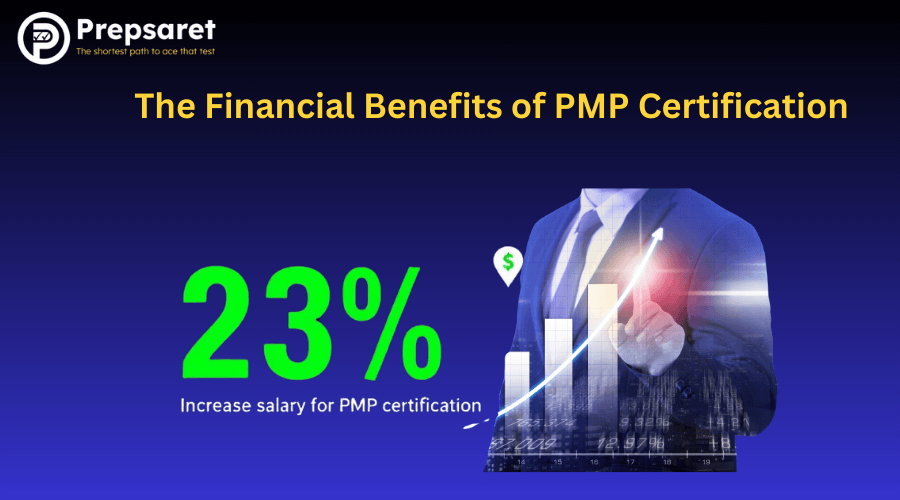
One of the most compelling reasons to pursue PMP certification is the substantial financial benefits it offers. PMP certification significantly increases earning potential, leading to higher salaries for certified professionals. This certification is recognized globally and is a testament to your expertise, making you a valuable asset to any organization.
Taking and passing the PMP exam is necessary to unlock these financial benefits. The Project Management Professional (PMP) certification exam rigorously tests your project management knowledge and skills. Certified project managers frequently experience a significant salary boost, reflecting their advanced qualifications and capabilities.
Average Salary Increase for PMP Certified Professionals
PMP certification is a surefire way to boost your salary. In the United States, the current median salary for PMP certified professionals is $120,000, significantly higher than their non-certified counterparts. In cities like San Francisco, PMP certified professionals earn an average exceeding $125,000 per year.
This clearly illustrates that PMP certification benefits include a substantial PMP certification salary increase.
Project managers with ten years of experience can expect an average salary of $125,792, demonstrating the long-term financial rewards of holding a PMP certification. Moreover, PMP certified project managers earn 33% more than their non-certified peers on average, showcasing the increased earning potential of this credential.
PMP Salary by Industry
The financial benefits of PMP certification vary across industries, but they are universally impressive. For instance, PMP certified professionals in Research and Development earn a mean salary of $120,466. In specific locations, the salary ranges can be even more enticing. In Atlanta, PMP certified positions range from $80,000 to $160,000, while in Arlington, VA, salaries can go as high as $180,000.
The financial benefits of PMP certification vary across industries, but they are universally impressive. For instance:
- PMP certified professionals in Research and Development earn a mean salary of $120,466 according to the pmi salary survey.
- In Atlanta, PMP certified positions range from $80,000 to $160,000.
- In Arlington, VA, salaries can go as high as $180,000.
Project Manager III positions have a mean salary of $112,314, reflecting the high value placed on experienced project managers in various industries. Whether you’re in IT, healthcare, finance, or event management, the PMP certification significantly enhances your earning potential and opens doors to lucrative job opportunities.
PMP Salary Growth Over Time
The financial benefits of PMP certification are not just immediate but also long-lasting. As project managers gain more experience, the value of their PMP certification compounds over time, leading to continuous salary growth. For instance, the average salary for an experienced project manager with a PMP certification is CAN$104,529, showcasing the long-term financial rewards of this credential.
PMP certification positively impacts salary growth over time, as it reflects both competence and experience. This continuous increase in salary is a testament to the enduring value of the PMP certification in the project management field.
Enhanced Job Opportunities
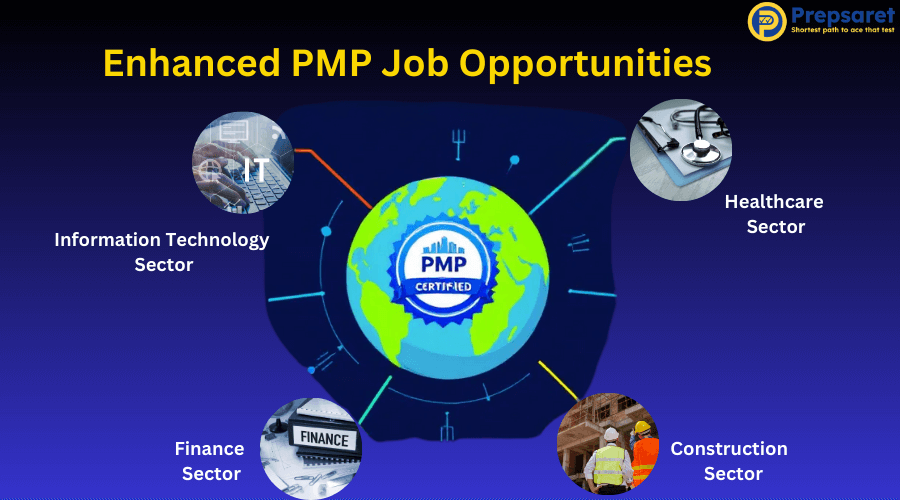
PMP certification is not just about earning a higher salary; it also opens up a plethora of job opportunities and career paths. With PMP certification, experienced project managers gain a competitive edge in the job market, as many employers prioritize or even require this credential for project management positions. This certification is a testament to your skills and knowledge, making you a sought-after candidate in various industries.
The PMP certification also equips you with the human skills needed for project management, which remain crucial even amid the rise of AI and automation. This combination of technical and soft skills ensures that PMP certified professionals are well-prepared to lead projects successfully, thereby enhancing their job prospects significantly.
Global Recognition and Mobility
One of the standout benefits of PMP certification is its global recognition. More than a million professionals worldwide hold PMP certification, making it a critical qualification in project management. This widespread acknowledgment facilitates international job opportunities, allowing certified professionals to work in different countries and industries.
Acquiring a PMP certification unlocks various job opportunities both locally and globally. It also enhances options for remote work, providing flexibility and mobility in your career. This global recognition makes your PMP certification a valuable asset, regardless of where you choose to work.
High Demand in Various Industries
The demand for PMP certified professionals is high across various industries. The global economy is projected to need 25 million new project professionals by 2030, underscoring the increasing demand for PMP certified individuals. This demand is not limited to a single sector; industries such as finance, healthcare, IT, and travel all recognize the value of PMP certification.
In the United States alone, there are over 14,000 open positions for PMP Certified Project Managers, reflecting the high demand in the job market. This diverse range of job opportunities enhances employment flexibility, allowing PMP certified professionals to find fulfilling roles in various industries, contributing to a successful project management career.
Improved Project Management Skills
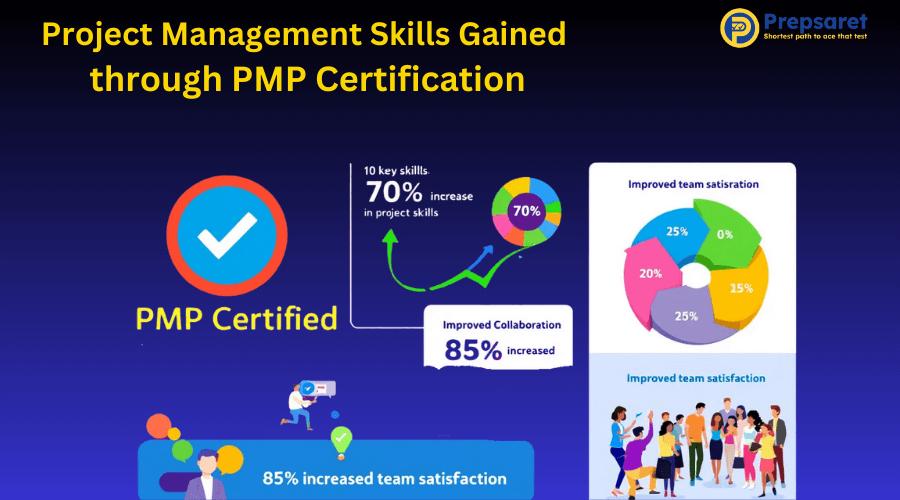
PMP certification is not just a credential; it’s a comprehensive training program that significantly enhances your project management skills. The certification provides guidance and leadership for successful project execution, helping you organize and simplify project processes, which is vital for any business.
Through PMP certification, professionals learn critical skills such as leading teams, solving problems, and making important decisions. These skills are essential for effectively managing projects and ensuring their success, making PMP certified professionals invaluable to their organizations.
Mastery of Project Management Frameworks
The PMP certification curriculum covers various methodologies, including Waterfall and Agile frameworks. Understanding these frameworks is essential for effectively organizing and executing projects. The PMBOK Guide, a key component of the PMP certification, tests skills and knowledge in predictive and agile project management strategies, ensuring comprehensive mastery of these frameworks.
This training includes frameworks like Agile, Waterfall, and Hybrid to suit various project needs, providing a versatile skill set that can be applied to different types of projects.
This mastery of project management frameworks is a significant benefit of PMP certification, enhancing your ability to manage projects successfully.
Check Out: PMP Online Course for Agile Certification
Increased Project Success Rates
Statistics show that PMP certification leads to higher project success rates among professionals. Organizations with PMP-certified project managers report better project outcomes compared to those without, underscoring the value of this credential.
PMP certification correlates with a 20% increase in project success rates, demonstrating its impact on project outcomes. This increased success rate is a testament to the effectiveness of the PMP certification in equipping professionals with the skills and knowledge needed to lead projects to successful completion.
Professional Development and Networking
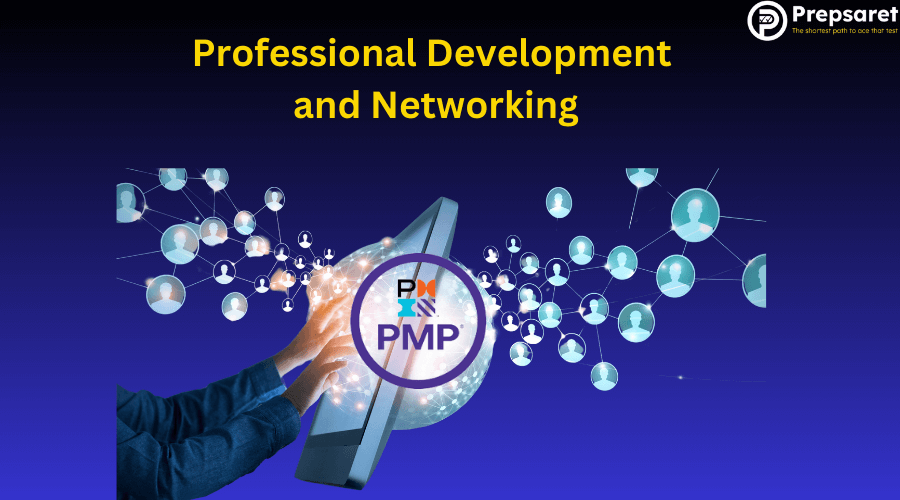
PMP certification provides significant opportunities for professional development and networking. Many pursue it for career satisfaction and better financial prospects. The certification improves the application of project management knowledge in the workplace, offering valuable best practices for managing projects.
Additionally, professionals can earn Professional Development Units (PDUs) through various activities, including education and volunteering, supporting ongoing professional development. This continuous learning ensures that PMP certified professionals stay updated on industry standards and best practices.
Access to PMI Resources
Becoming a member of the Project Management Institute (PMI) offers important benefits that promote continuous learning and development in project management education. PMI members have access to an array of educational resources, including workshops, seminars, and online courses, which are invaluable for professional growth.
PMI’s global chapter network allows professionals to connect with peers and industry experts, enhancing their professional networks. Utilizing these resources from PMI can greatly contribute to an individual’s success and professional growth in project management.
Expanding Your Professional Network
Joining PMI opens doors to local chapter events, facilitating connections with industry peers. Networking is vital for PMP certified professionals as it enhances career opportunities and growth through connections. Participating in PMI-hosted events allows PMP certified professionals to connect with peers, share experiences, and explore potential career advancements.
This expanded professional network not only helps in finding new job opportunities but also provides a platform for continuous learning and development, making PMP certification a valuable asset for career advancement.
Career Advancement and Credibility
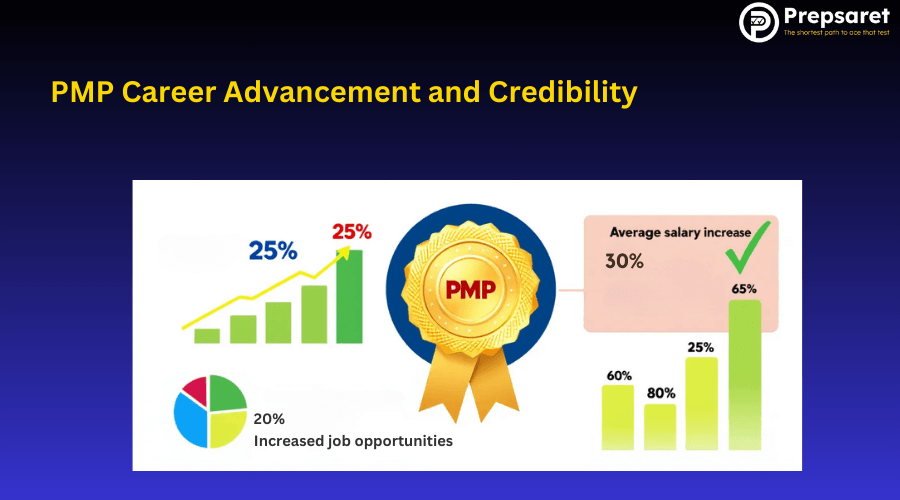
Holding a PMP certification demonstrates a serious commitment to project management, enhancing career prospects. Certified project managers are valued by employers and significantly contribute to organizational success. This certification increases the chances of project success, as experienced, certified staff are more likely to complete projects on time and within budget.
PMI membership boosts networking opportunities, enabling professionals to meet colleagues, gain volunteering experience, and attend local events. This blend of credibility and networking makes PMP certification a powerful asset for career advancement.
Promotion and Leadership Opportunities
PMP certification can enhance your chances for promotions, as it demonstrates advanced knowledge and skills in project management. Holding a PMP certification is likely to position professionals for leadership roles, demonstrating their capability to manage complex projects effectively.
The industry widely recognizes PMP certification as a mark of competency in project management, improving an individual’s chances of receiving promotions within their organization. This recognition makes PMP certification a valuable asset for career advancement.
Credibility with Employers and Clients
Putting ‘PMP’ after your name signifies project management expertise, indicating to hiring organizations that you are a certified project manager with proper knowledge, skill, and experience. PMP certification increases credibility and professional reputation with employers and clients, providing assurance as verifiable proof of your skills, tools, and training.
According to Timothy Kucejko, obtaining PMP certification can lead to increased respect for your expertise, further enhancing your professional reputation. This increased credibility makes PMP certification a powerful tool for career advancement and professional success.
Steps to Becoming PMP Certified
Achieving PMP certification involves several steps: meeting eligibility requirements, preparing for the exam, and maintaining the certification through ongoing professional development.
The following outlines these steps to guide aspiring project managers on their journey to becoming PMP certified.
Meeting Eligibility Requirements
To qualify for the PMP certification, candidates must meet specific educational and experiential requirements that demonstrate their project management proficiency. A secondary degree holder must have five years of project management experience with 7500 hours leading projects, while a candidate with a four-year degree must have three years of project management experience and a minimum of 4500 hours leading projects.
These experience requirements ensure that candidates are adequately prepared for the PMP exam and possess the necessary skills to manage projects effectively. Fulfilling these eligibility criteria is the first step toward PMP certification.
Preparing for the PMP Exam
Preparing for the PMP exam requires a thorough understanding of project management principles and practices. Utilizing a variety of study materials can enhance understanding and retention of PMP concepts. Multiple sources should be used for comprehensive coverage of topics during PMP exam preparation.
For PMP exam preparation, platforms like Prepsaret offer effective study materials, including practice questions, to help you succeed. Additionally, the PMBOK Guide is a key resource, covering both predictive and agile project management strategies tested in the exam.
Thorough preparation using these resources is essential for passing the PMP exam and earning your certification.
Maintaining Your PMP Certification
Maintaining PMP certification is an ongoing process that requires a commitment to continuous learning and professional development. To renew PMP certification, professionals must earn 60 Professional Development Units (PDUs) every three years. PDUs measure continuing education for project management professionals, essential for maintaining certification.
Earning PDUs demonstrates ongoing professional development and ensures project managers are equipped with up-to-date knowledge and skills. This continuous education ensures that PMP certified professionals stay current with industry standards and best practices, maintaining the value and relevance of their certification.
Find out: How to Earn 60 Free PDUs for PMI’s PMP Certification Renewal
Summary
In summary, obtaining PMP certification offers numerous benefits that can significantly enhance your project management career. From substantial salary increases and enhanced job opportunities to improved project management skills and professional development, the PMP certification is a valuable credential that opens doors to new career paths and growth opportunities.
The journey to becoming PMP certified involves meeting eligibility requirements, preparing rigorously for the exam, and maintaining the certification through ongoing education. The investment in PMP certification is undoubtedly worth it, providing a strong foundation for long-term career success and professional credibility. Embrace the challenge and let PMP certification be the catalyst for your project management career advancement.
Frequently Asked Questions
What Are the Eligibility Requirements for PMP Certification?
To be eligible for PMP certification, candidates need either five years of project management experience with 7,500 hours leading projects if they have a secondary degree, or three years with 4,500 hours leading projects if they hold a four-year degree. Meeting these criteria is crucial for your PMP application success.
How Does PMP Certification Enhance Job Opportunities?
PMP certification significantly enhances job opportunities by making candidates more attractive to employers who value project management expertise. It not only broadens your career prospects but also gives you a competitive advantage in the job market.
What Resources Are Available to PMI Members?
PMI members can access a variety of educational resources, such as workshops, seminars, and online courses, as well as connect with peers and industry experts through PMI's global chapter network. These resources enhance professional development and networking opportunities.
How Do I Maintain My PMP Certification?
To maintain your PMP certification, you must earn 60 Professional Development Units (PDUs) every three years, which helps keep your knowledge aligned with industry standards and best practices. Prioritize ongoing education to ensure your skills remain relevant.

